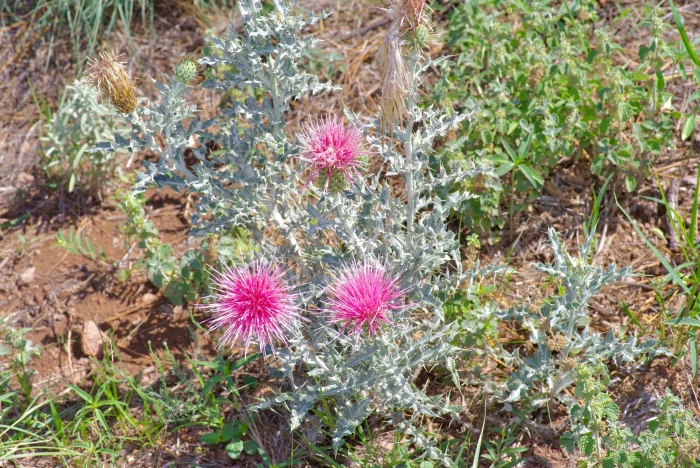Yellowspine Thistle
(Cirsium ochrocentrum)
Yellowspine Thistle (Cirsium ochrocentrum)
/
/

Michelle W.
CC BY 4.0
Image By:
Michelle W.
Recorded By:
Copyright:
CC BY 4.0
Copyright Notice:
Photo by: Michelle W. | License Type: CC BY 4.0 | License URL: http://creativecommons.org/licenses/by/4.0/ | Rights Holder: Michelle W. | Publisher: iNaturalist | Date Created: 2022-08-11T16:41:48-07:00 |

























Estimated Native Range
Climate Requirements for Berlin, Germany
| This Plant | Your Site | Plant Suitability for Your Location | ||
|---|---|---|---|---|
| • Precipitation | 9" - 35" | 23" | Your precipitation may be too high for this plant. | Too high |
| • High Temp. | 64°F - 100°F | 75°F | Your summer temperatures are normal for this plant. | Excellent |
| • Low Temp. | 2°F - 45°F | 29°F | Your winter temperatures are normal for this plant | Excellent |
This plant may not grow well at your location - your precipitation is too high.
Summary
Cirsium ochrocentrum, commonly known as yellowspine thistle, is a perennial herb native to the Great Plains and desert regions of the western United States and northern Mexico. It typically grows up to 3 feet tall and is characterized by white woolly stems and deeply lobed, spiny leaves. The inflorescence features spiny-tipped flower heads with disc florets that can be white, pink, or lavender, blooming from late spring to early fall. This thistle is often found in grasslands, prairies, and desert scrub environments, where it is adapted to dry, open spaces with plenty of sunlight.
Yellowspine thistle is known for its striking appearance and is sometimes used in wildflower gardens for its unique texture and form. However, it is also considered a noxious weed in some areas due to its aggressive nature and ability to outcompete native vegetation. In cultivation, it requires minimal water once established and thrives in well-drained soils under full sun. The Zuni people have historically used infusions of yellowspine thistle for medicinal purposes. Gardeners should be aware that this plant can spread rapidly and may require management to prevent unwanted proliferation.CC BY-SA 4.0
Yellowspine thistle is known for its striking appearance and is sometimes used in wildflower gardens for its unique texture and form. However, it is also considered a noxious weed in some areas due to its aggressive nature and ability to outcompete native vegetation. In cultivation, it requires minimal water once established and thrives in well-drained soils under full sun. The Zuni people have historically used infusions of yellowspine thistle for medicinal purposes. Gardeners should be aware that this plant can spread rapidly and may require management to prevent unwanted proliferation.CC BY-SA 4.0
Plant Description
- Plant Type: Herb
- Height: 1-3 feet
- Width: 1-2 feet
- Growth Rate: Moderate
- Flower Color: Pink, Purple
- Flowering Season: Spring, Summer, Fall
- Leaf Retention: Deciduous
Growth Requirements
- Sun: Full Sun
- Water: Low
- Drainage: Medium, Fast
Common Uses
Butterfly Garden, Deer Resistant, Drought Tolerant, Low Maintenance, Rabbit Resistant
Natural Habitat
Native to grasslands, prairies, and desert scrub environments
Other Names
Common Names: White Thistle, Gray Thistle
Scientific Names: Cirsium ochrocentrum, Carduus ochrocentrus, Carduus undulatus var. ochrocentrus, Cirsium ochrocentrum var. townsendii, Cirsium townsendii, Cnicus ochrocentrus, Cnicus undulatus var. ochrocentrus
GBIF Accepted Name: Cirsium ochrocentrum